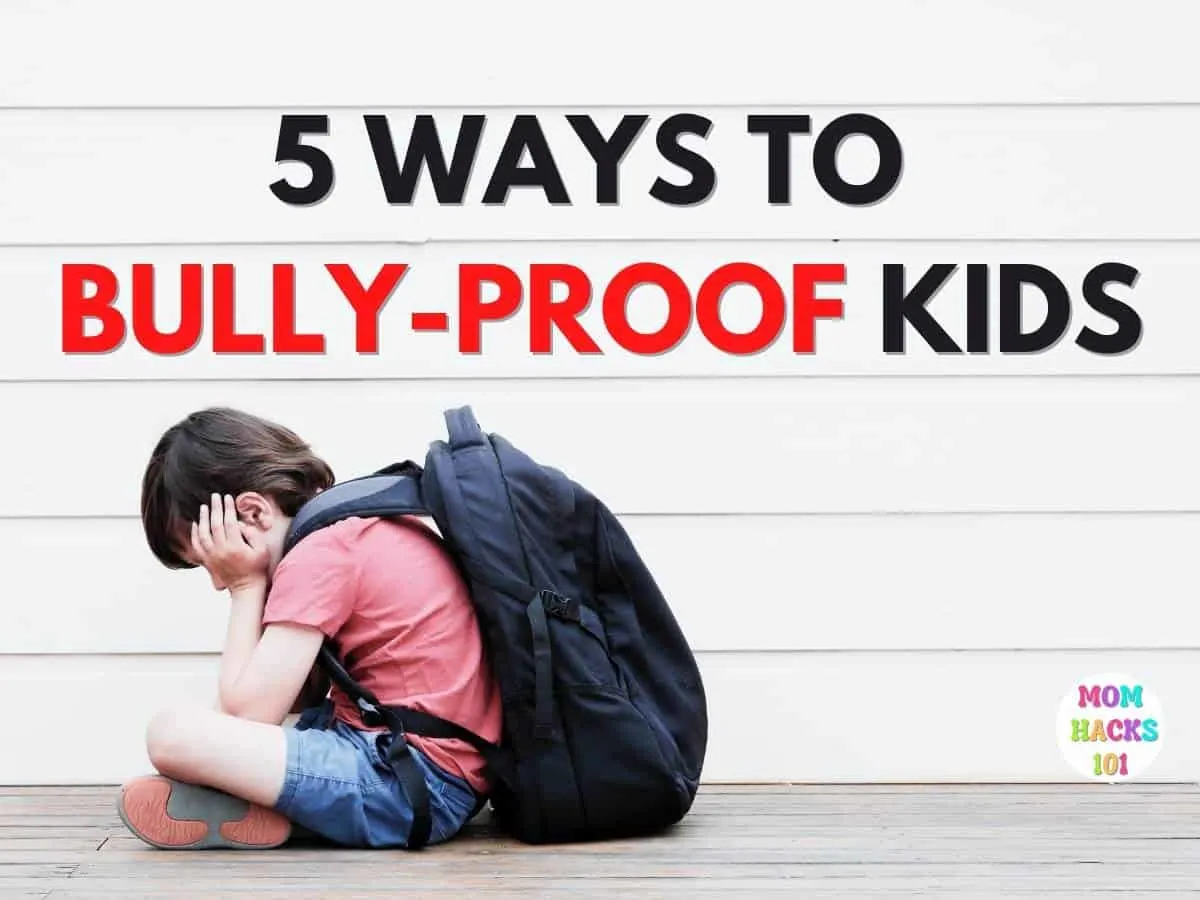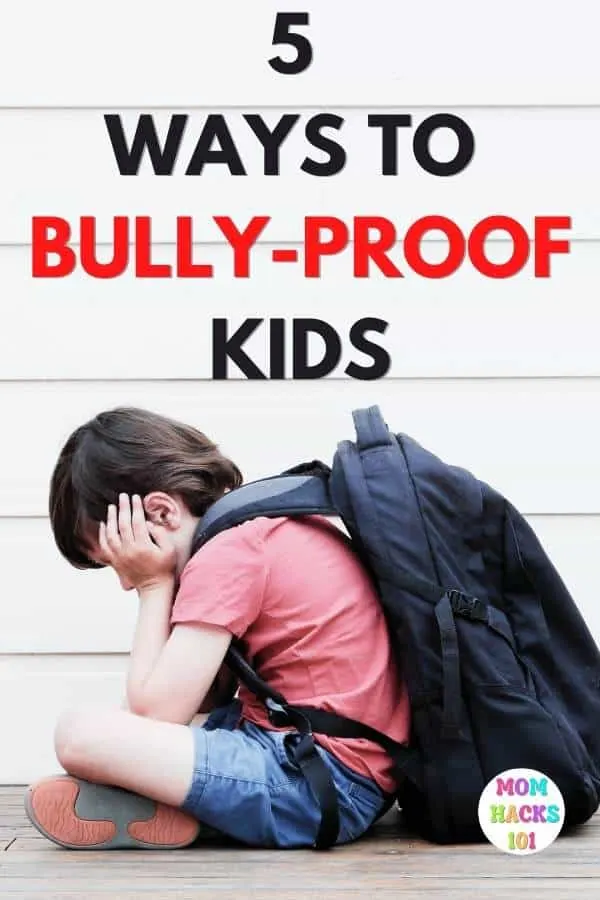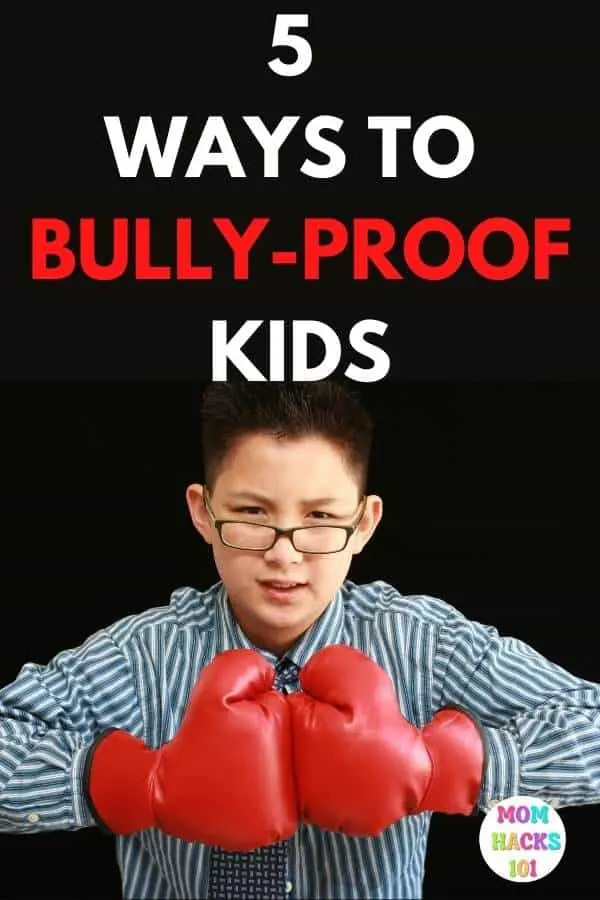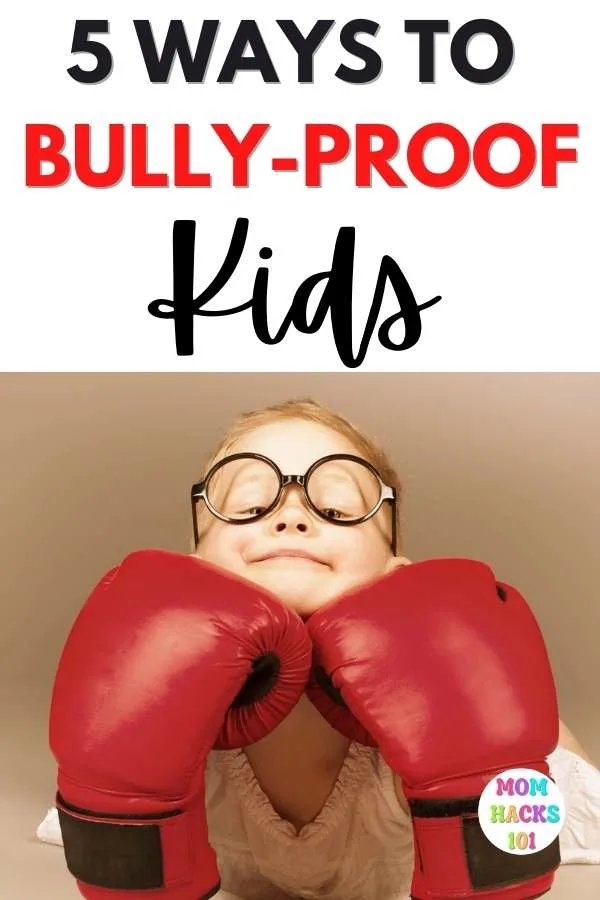Is your kid getting bullied?
Use this advice against bullying to help bully-proof your child!

Bullying is a problem that affects children of all ages and backgrounds.
It can happen online or in person, and it causes a lot of damage to kids.
Bullying can range from name-calling, exclusion from groups, physical violence, and even death.
One way to stop bullying is to teach kids at a young age how to deal with bullies.
This includes teaching a child what they should do if they are being bullied and how to reach out for help when needed.
What Is Bullying?
Bullying is a form of aggression that involves a person or group of persons who repeatedly harm or show hostility toward someone else.
These actions can include teasing, taunting, provocation, threats, assault, or other behaviors that are intended to cause pain or distress. Bullying is typically repetitive and can happen in person or online.
The most common types of bullying are: verbal, emotional, physical, and cyberbullying.
A study found that about 40% of students in grades 6 to 12 had been bullied on school property at least once during the past year.
The same study found that 18% of students in grades 6 to 12 were the perpetrators at least once during the past year.
Bullies may be motivated by social and cultural factors such as their family background and gender, as well as individual factors such as their personality and intelligence levels.
Bullying can be described as a form of aggression or violence; an activity engaged in by one or more people with an intent to cause discomfort, offense.
Effects Of Bullying
Bullying is one of the major detriments to the development of children.
When kids get bullied it affects them in many ways. They are not happy, they can’t focus, they are angry and aggressive, they even may be afraid to go to school and they don’t know how to deal with their emotions.
It is common for children who are being bullied to feel sad and uncomfortable, withdraw from school activities, and have trouble sleeping well at night.
Children who are bullied may also experience headaches and stomachaches or develop social problems like anger management issues or low self-esteem.
The negative effects of bullying on children have been studied extensively by psychologists.
These include anxiety, depression, post-traumatic stress disorder, suicide ideation, and suicide attempts.
Bullying is a form of violence that has serious consequences for its victims’ present and future life prospects.
Bullying is often seen as a rite of passage or joke but it’s no laughing matter for kids who are being bullied or those who witness it happening.

Bullied Kids: Ways To Bully-Proof Your Child
Helping a child deal with bullying at any age in their life is hard.
There are harsh words, mean actions, and most definitely confusion on why this is happening to them at this point in time in their life.
But the truth be told, there is no logical answer or reason as to why bullying happens.
While there might be theories or conversations that can occur, the best way to move forward from a bullying situation is to help your child become bully-proof so that they can overcome the rudeness and hate.
When you’re looking for a way to build up your child to use their own confidence to be strong, the following tips and ideas can help during these challenging times.
Even though there is no way to free your child from the wrath of bullies completely, there are tips and values that you can help instill that can help your little one overcome situations when they arise.
Talk About How To Identify A Bully
If your child doesn’t really know what a bully is, they’re not going to know how to deal with one properly.
Having an open conversation about bullies is one of the quickest and easiest ways to help them figure out how to steer clear of them.
It’s just as important to talk to them about how bullies can mean a variety of different things so that they understand how to know when a bullying situation is happening.
Since being a bully isn’t about how someone “looks” on the outside, having conversations about words and personalities is key.
Talk to your child about mean words or phrases that might be used and go over some examples with them of what makes someone a bully.
This isn’t to scare them or worry them, but it is an excellent way to get them prepared to identify a bullying situation should one come up.
Teach Them How To React To Bullying
Once you have a conversation with your child about what bullies will act like and things that they will potentially say, it’s time to equip them with the tools to work through these scenarios.
And even though you’re going to want to help them out and give them all the answers, there is no way possible to be able to do that.
The best that you can possibly do is work through a variety of ideas so that they can use those thoughts to brainstorm more on their own.
One way to help them with ideas is to talk about any instances with bullies that you’ve had in your life and tell them what you did to overcome it.
This makes it not only real but relatable as well.
Don’t forget that there are also great resources that you can take advantage of for talking to your child about bullying.
Grabbing books from the public library or even setting up a meeting with the school counselor can be positive steps to take to help address any potential bullying issues as well as help with any current ones as well.
There are many books that talk about how to handle a bully. One of my favorite parenting books really delves into advice against bullying.
Talk To Your Child About Letting Others Know
One of the biggest issues about bullying is that oftentimes, the ones being bullied are too scared to let anyone else know.
This may be because they’re worried that they’ll get bullied even more, or they may be worried that they’ll lose a “friend,” even though that “friend” isn’t actually a true friend at all.
Sitting down and having this conversation with your child is key to helping them overcome bullying situations.
If they don’t know that there are adults out there that can help them, they may find themselves in a cycle of staying under the bully’s thumb.

How To Deal With Bullying At School
Parents, teachers, and other adults play a vital role in fostering the social development of children.
Bullying takes an emotional toll on all children, but it is most harmful to those who are bullied at home or at school.
In most cases, teachers and parents can help children create effective coping strategies to deal with bullying.
If the school district in your area has a no-bullying policy, make sure to talk to your child about that and let them know what it means.
If your child is being bullied, you should first find out who or what they are being bullied by. This will help you figure out how to help them.
One way is to talk with the teacher or school counselor about the bullying problem.
They can provide some suggestions for what you should do next based on your situation and the size of the bullying issue.
Many schools have programs to educate students on bullying prevention and intervention to help stop bullying before it starts, but we still need to do more because there is no “one size fits all” solution when it comes to this problem.
Another way you can help your child is by letting them know that they have support from home and reassuring them that they did nothing wrong so it’s not their fault.
Let your child know that you’re always there for them to come to when they’re having issues with bullies at school, as are the teachers or educators at their school.
This will give them the confidence to immediately speak up if they’re being bullied OR if they know that someone else is being bullied, too.
And speaking of others being bullied…
Encourage Your Child To Report Bullies
Last but not least, help your child to understand that bullying can happen to anyone at any time.
It might be happening to one of their friends, family members, or even someone that they don’t know but have passed by in the hallway at school.
To stop bullying, the bully has to be identified. This can only happen if the person who is bullying others is reported.
This is where your child can help out and squash bullying once and for all.
If they see someone being bullied or hear of someone being bullied, encourage them to report this to the adults in the school district.
Make sure that they know that reporting it is what it takes to stop the constant bad behavior.
It’s also just as important to help them understand that bullying can come in a wide variety of ways.
Words and actions that are harmful are the most obvious signs of bullying but so are actions like stealing, giving dirty looks, or causing issues among other students to oust someone constantly from activities and groups.

Advice Against Bullying For Kids
As you can tell, there are steps that you can take as a parent to help your child navigate through the years of growing up.
More than likely, children will come into contact with at least one bully in their life, but you have no idea how or when this will happen.
The best thing that you can do while they’re young is to give them the knowledge and ability to overcome situations as they arise.
These tips and tools will help them stay true to who they are while still continuing to be kind and courteous to those around them.
Do you have any other tips or ways to bully-proof kids?
For more parenting tips be sure to read: How To Build Confidence In Shy Kids and How to Raise A Boy To Be A Good Man.
Check out our Smart Mom Resources for more parenting books and tips to raise awesome kids!
